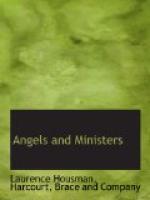CHAMBERLAIN. I wonder.
DIST. V. I assure you, I shall make a point of it. Believe me, I am very grateful for this opportunity you have given me; and even more am I grateful for all your long loyalty in the past. Through all differences, through all difficulties, I have felt that you were indeed a friend. So, till we meet again, my dear Chamberlain, good-bye!
(The two hands meet and part, while the Nurse moves forward to resume her professional duties. The Distinguished Visitor begins to retire.)
CHAMBERLAIN. Good-bye...You can find your way?
DIST. V. (turning gracefully as be goes). Perfectly! (And treating the door with the same perfection of courtesy as be treats all with whom he comes in contact, be goes to take his leave of other members of the family. The door closes; the Nurse is punching the pillows; Chamberlain speaks:)
CHAMBERLAIN. So that’s the end, eh?... Charming fellow!
(And so saying, be settles back to the inattention of life to which he has become accustomed.)
The Instrument
Dramatis Personae
WOODROW WILSON (Ex-President of the United States
of America)
MR. TUMULTY (His Secretary)
A GRACIOUS PRESENCE
AN ATTENDANT
The Instrument
SCENE; Washington. March 4th, 1921.
Through, the large windows of this rather stiffly composed sitting-room Washington conveys an ample and not unimpressive view of its official character. The distant architecture, rising out of trees, is almost beautiful, and would be quite, if only it could manage to look a little less self-satisfied and prosperous. Outside is a jubilant spring day; inside something which much more resembles the wintering of autumn. For though this is an entry over which the door has just opened and closed, it is in fact an exit, final and complete, from the stage of world-politics, made by one who in his day occupied a commanding position of authority and power. That day is now over. In the distance an occasional blare of brass and the beat of drums tells that processions are still moving through the streets of the capital, celebrating the inauguration of the new President. It is the kind of noise which America knows how to make; a sound of triumph insistent and strained, having in it no beauty and no joy.
The Ex-President moves slowly across the room, bearing heavily to one side upon his stick, to the other upon the proudly protecting arm of his friend, Mr. Secretary Tumulty. Into the first comfortable chair that offers he lets himself down by slow and painful degrees, lay’s his stick carefully aside, then begins very deliberately to pull off his gloves. When that is done, only then allowing himself complete relaxation, he sinks back in his chair, and in a voice of resigned weariness speaks_.




